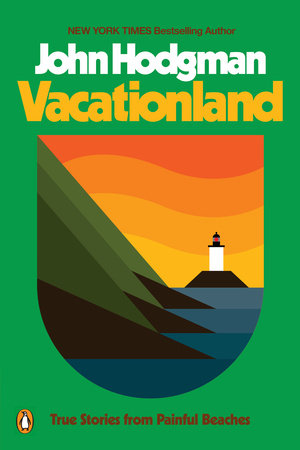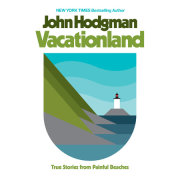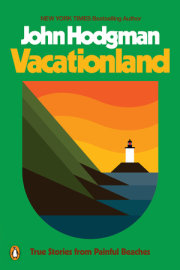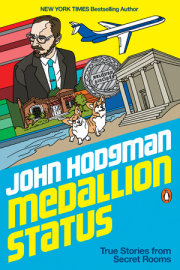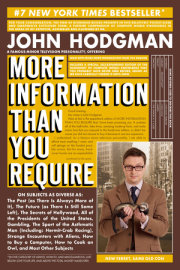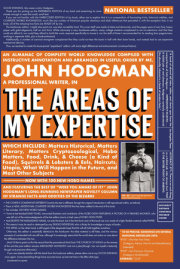The Bookkeeper for the Church of Satan
I apologize for my beard. Not only because it is terrible-thin, patchy, and asymmetrical-but also because it is inexplicable. Many people have asked me why I grew it, and most of those people are my wife, and to them and to her I say: I don't know. I'm sorry.
Before my beard I just had a mustache, and that was not mysterious at all. In fact, I have grown two mustaches in my life, for equally banal, emotionally transparent reasons. I grew the first one in 1999, in the yearlong run-up to my marriage to the woman who is still my wife. I had only ever been clean-shaven before then (aside from an obligatory early-'90s flirtation with a soul patch in college), and I suppose now I was testing her. A few very good-looking people I know turn mean when they drink, mocking and abusing the people who care about them. They make themselves ugly to see if people will still love them that way. I think my mustache-thick and dark and unwanted in the middle of my round pale face-served the same function: to be repulsive on purpose. I looked like a bushy nineteenth-century president who also happened to be a baby.
Luckily, my then-fiancée, whom I have known since high school and who had already seen me through various thicks and thins, did not take the bait. She did not confirm my fear that I was an unlovable fraud and did not decline to marry President Chester A. Baby. So I shaved off my mustache the morning after my bachelor weekend in a dilapidated mansion in Atlantic City that I had rented with a group of friends. I cannot remember whether this was my decision or her command. Maintaining such fogginess about free will is, I think, a secret to a lasting marriage. And ours has lasted. You have the numbers in front of you, so you can do the math. (I have never been good with subtraction, especially with odd numbers like 1999 and 2017.)
I grew my second, and currently enduring, mustache in 2011. By that time we had two children, whose actual names will never be revealed. As you know, I have always hesitated to talk about my children and, when pressed, would refer to our daughter only as "Hodgmina" and our son as "Hodgmanillo." In the past I have said that this is to protect their privacy, and that is true of our son who is, as of this writing, still young enough to like us. There are many joys of parenting, but ultimately we are robots training our own upgrades to replace us. But my son doesn't know this yet. He doesn't know that his job is to grow and thrive apart from us and conspire with time in our destruction. He still holds our hands and does not treat us like we are hopelessly stupid and so I wish to protect him.
But Hodgmina is now a luminously smart teenager with a strong social media presence who I think would enjoy being named in this book. So I keep her anonymous to spite her. I love her. I hope of course that she will outlive me (these are the fun hopes you nurture when you are older). But I do not need to help her outpace me in fame.
Insecurely teasing a teenager is a privilege of fatherhood. And I grew my second mustache for the same reason all your weird dads grew theirs: it is an evolutionary signal that says, "I'm all done." A mustache sends a visual message to the mating population of Earth that says, "No thank you. I have procreated. My DNA is out in the world, and so I no longer deserve physical affection. Instead, it is time for me to turn away from sex and toward new pursuits, the classic weird dad hobbies such as puns, learning trivia about bridges and wars, and dreaming about societal collapse and global apocalypse."
All dads dream about the end of the world. It is a comfort to them. For some, the fantasy is blunt, vengeful, and aspirational. The zombie epidemic story, as one example, is consistently popular for a simple reason: when chaos consumes civilization, you can start over. You get to be young again. All your debts, real and emotional, are canceled. Whatever your dumb job used to be, it has now been replaced with the sole, exciting occupation of survival via crossbow or samurai sword. You get to dress up and wear armor or an eyepatch. And since your neighbors have now been transformed into the idiot monsters you always believed them to be, the zombie epidemic offers you moral permission to shoot them in the head, finally.
(This is not my fantasy, by the way. I have often thought that if The Walking Dead really wanted to provoke horror, its last season would time-jump five years to a future in which the government re-forms, the zombies have been cured (aside from the ones our heroes decapitated), and all the characters have to get dumb jobs again. The humans will have to work alongside the horribly mutilated cured zombies and think about what they did to survive, and what what they became, while they all sit around in the break room together with their reheated soups. That said, I don't want to sound snobby about zombies. I get it. If there were a zombie show that just featured the characters endlessly raiding supermarkets for canned goods and then stocking those cans neatly back in their compound pantry, I would watch it for nineteen seasons. Guns and power and the weird masculine redemption fantasy of white dudes getting back to running things has never meant as much to me as abundant, well-organized food.)
The apocalypse I dreamed of was different, and presented a different consolation. I was in the Pioneer Valley, in the western part of my home commonwealth of Massachusetts, an important place in my life. I was sitting in the Montague Bookmill, a used-book store inside a creaky old sawmill that looks about to collapse into the shallow little river that once powered it. It was where I had written a lot of my first two books, and I was now trying to start another. But I was having trouble because I had just realized that I was not going to live forever.
The thought had never occurred to me before. I am a straight white man, the hero of almost every story I had ever encountered. What's more, I am an only child. The idea that the world could continue without me was not only unimaginable, it was insulting. But in that moment, something shifted. I was upstairs at the Bookmill alone, sitting at a nicked wooden table before two open windows, their glass wavy with age. The door behind me was open and full of sun, the ancient eaves above me cold with summer shadow, the little river giggling outside as it slowly consumed its rocky foundation. I was halfway through my fortieth year, Mustache II in graying bloom, writing a book in a used-book store, exactly where books go to die. And then it was a physical sensation that I remember: suddenly I was gripped, just above my stomach, by the dumb, offensive truth. Everything ends. Nothing lasts. Not even John Hodgman.
This is a truth so obvious that we build whole world religions, grandly spangled with art and rituals and distracting hypocrisies, in order to avoid thinking about it. And if we do not succumb to religion or myth, we tell ourselves other wild stories to make us feel better. The story I started that day was That Is All, the last book I wrote before this one. It was the third in a trilogy of fake facts and invented history that I originally wrote for a general audience but had found a particular following among strange thirteen-year-olds. So I thought I would treat those kids to a comedy book about everyone on Earth dying all at once.
I know that sounds like a big literary innovation, but the truth was, the end-times were trending. Everyone was talking about how the ancient Mayans had calculated that the world would end in December 2012. I just added some other equally plausible elements: a giant ravaging swarm of stray dogs, a massive tsunami of blood, and eventually the Earth cracking in half to release the giant magical toad at its center on 12/21/12. Nothing you wouldn't find in any bad Google translation of the Book of Revelation, but it comforted me. Unlike the zombie apocalypse, global annihilation offered a different, better consolation: not that I could escape death, but that when I died, I got to take everyone else with me. I may not have been there at the beginning of creation, but I would be there to turn the lights off. It just felt right.
You may have noticed the world did not end on December 21, 2012, as the Mayans and I predicted. I blame the Mayans. Looking back, it was probably stupid to trust the math of an ancient people. Their calendars were made of stone, and they couldn't even make smooth pyramids. But on December 22, I was disappointed. Obviously I didn't actually want my wife and children and everyone else to be crushed by a giant, ancient, unspeakable god crawling across the Earth. But I hadn't really made any plans for the world not ending, and now I was stuck. I had lined up no work for 2013. And honestly, what more was there for me to do?
I had written a thousand pages of fake facts. It was every joke I knew how to tell, every story I had inside of me. And those pages, against all reasonable expectation based on my age, experience, neck fat, and asymmetric eyes, put me on camera next to my hero, Jon Stewart, and then in a series of ads for Apple. (I never met my other hero, Steve Jobs, because I was shy and still thought we had all the time in the world.)
I had slept in the bungalow where John Belushi died. I had sipped martinis in the East Hampton home called Grey Gardens out of glasses I found in the cupboard monogrammed "EBB" for Edith Bouvier Beale. I had been hugged by Chuck D. I had not only met the forty-fourth president of the United States (Barack Obama), but also goddamn George R. R. Martin, who sought me out at a Hollywood post-Emmy party, reached in his pocket, and handed me a coin of the Faceless Man. And if that means anything to you, then you will also find it meaningful that at the same party a year later, he reached in his pocket and handed me ANOTHER ONE.
Yes, George R. R. Martin carries around pocket caches of coins of the Faceless Man just to blow nerd-minds at parties, and I have that information because of the insanely fortunate, surreal life-beyond-imagining that had grown out of my books, my life's work; work that was now complete. Plus I had a perfect, beautiful, challenging wife, healthy children who cared nothing for sports, and I had been on Battlestar fucking Galactica. Honestly the world should have exploded just to punish me.
But it did not explode. The world was ending, yes, but only in the same slow dumb way it has always been. And so I suddenly had years to fill. I didn't know how many, and I didn't know how. And I had a sad guilty sense that filling those years would just be taking up space, hogging air and attention that, in a fair life, would be better apportioned to younger, hungrier souls.
So yeah, why not grow a beard? When you don't know what to do in your life, there is always the mystery of what happens if you just do nothing. What if I just stop taking care of myself? And what will come out of my face?
My beard is the answer. You cannot see it, but I must make you see it so you will know my shame. Its lushest portions gather on my neck (of course) and terminate to a devilish point on my chin. On the sides, it looks like salt-and-pepper ants climbing up and down my face. The mustache and soul patch of yore are still there, but still refusing to connect to each other or any other part of the madness, probably because they hate each other.
In the great, unmatching bald expanses of my cheeks there are strands of lone, black, tough, wiry hairs-like the kind Jeff Goldblum manifested when he first began transforming into the fly in The Fly. If you understand that reference, you will also understand this one: I look like I invented a teleportation pod and used myself as the first test subject. But what I didn't know as I locked the door and threw the switch was that I was not alone. I had not noticed that a man had snuck into the pod with me-an actual man with an actual beard; and after our molecular intermingling in the air between the first pod and the other, I am the wretched half-hirsute chimera that emerged on the other side.
I knew it would turn out this way. But I was compelled to grow it. All men, I think, wonder who the secret man that lives inside them is and whom they will meet in the mirror when they stop shaving. They wonder if that man is better than the one they know. If that elder sage or fantasy wizard or feral mountain man will be wiser than they, and when they are lost, if that dude will light up his staff and guide them through the dwarven mines and out of the wilderness.
Based on the overall effect, the secret man inside me is the part-time bookkeeper for the Church of Satan. I'm the guy who goes in every other Monday and goes through the ledger and complains to the Magus that they are spending too much money on red candles. "And what is this? Thirty-five hundred dollars for cleaning? What was that for? The sex magick ritual? Jesus Christ, you guys . . . Oh! Sorry! I mean, Hail Satan!"
This is not the man I expected to live inside of me, but I am counting on him.
This is a book about me and my beard wandering through three wildernesses: the green mountains of rural western Massachusetts where I disposed of my youth, the mercilessly painful beaches of coastal Maine where I will eventually accept my death, and the haunted forest of middle age that lies between them. And here is a second apology. I will be honest with you: there are no fun fake facts in this book. While I may evade particular details and change some names in order to protect the privacy of those who did not ask to know me, the rest is all the awful truth about my dumb thoughts and feelings. I am sorry for this. It is all I have left.
Copyright © 2017 by John Hodgman. All rights reserved. No part of this excerpt may be reproduced or reprinted without permission in writing from the publisher.

